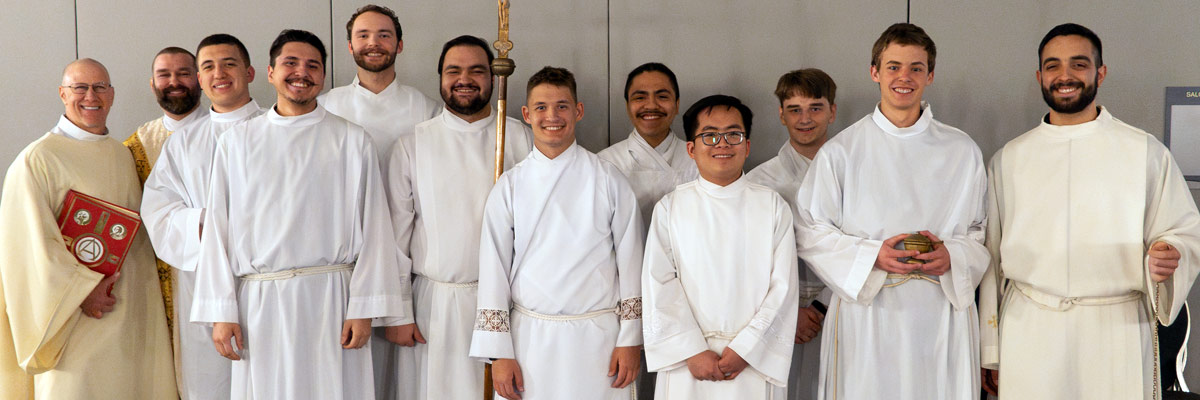Official Website of the
Catholic Diocese of Little Rock
Saturday, Christmas Weekday, Cycle I
Published: January 3, 2015
Bishop Anthony B. Taylor preached the following homily during the Come and See Retreat for those considering the priesthood at St. John Catholic Center in Little Rock on Jan. 3, 2015.

Bishop Taylor
In today's Gospel, John the Baptist calls Jesus "the Lamb of God who takes away the sins of the world." What does this mean for Jesus as he begins his public ministry? And what does it mean for us as we seek to know God's will regarding the possibility of public ministry in our own lives? In Jesus' case, the title "Lamb of God" contains three levels of meaning.
1.) The Passover Lamb — You will recall that the blood of a slain lamb was sprinkled on the doorposts of the homes of the Hebrew slaves in Egypt, such that when the Angel of Death killed the first-born of Egypt, it would pass over their houses, delivering them from destruction that night and finally forcing Pharaoh to let them go free. So too, as the Lamb of God, Jesus' blood on the cross will set us free from slavery to sin and death, and open for us the door to eternal life.
2.) The Temple Lambs — Lambs were sacrificed in the Temple every morning and every evening in expiation for the sins of the people (Exod. 29:38-42) and as we know from the story of the annunciation of John the Baptist's birth to Zechariah when he was serving in the Temple, John was the son of the priest and therefore a priest himself since the Jewish priesthood was hereditary. In calling Jesus the "Lamb of God," John is saying that regardless of the Temple rituals which he know so well, Jesus is the only sacrifice that can truly deliver us from sin.
The Lord can use you to make a difference as another Christ for today's world, as another "Lamb of God" who offers himself in loving sacrifice because in our specific case, that is what faithfulness to God requires.
3.) The Gentle Lamb — of the prophets, spoken of by Jeremiah (11:19) and Isaiah (53:7) who by his sufferings will redeem his people. John may be saying that Jesus is this gentle lamb who led meekly and humbly to slaughter will save us.
So in every Mass, when we pray "Lamb of God who takes away the sins of the world" we are echoing John the Baptist's theologically rich reference to Jesus as the Passover lamb whose blood sets us free, our gentle lamb offered daily now in the unbloody sacrifice of the Mass for our own redemption and for the needs of the entire world.
Jesus offered himself up to the Father as both priest and victim: he offered the sacrifice as priest and he was the sacrifice as victim ... and that sacrifice continues today. Every priest is configured to Jesus with special intimacy through ordination such that he becomes an "alter Christus", another Christ. And hence also another Lamb of God, such that in every Mass the priest offers his own body and blood in sacrifice to the Father too, united to that of Jesus.
In merely human terms, this of course seems impossible — but nothing is impossible for God! So open your hearts to the possibility that the Lord has chosen you for this most intimate and demanding and heart-warming role in his great work of salvation today.
Not just living for something bigger than yourself in general, but rather living for the biggest thing of all: God himself who invites you to be another Christ, another Lamb of God who takes away the sins of the world — 1.) sacramentally through baptism, through absolving sinners in confession, through offering the Eucharist, by exercising your sacrament of holy orders, and 2.) pastorally in working to build the Kingdom of God through your efforts to correct the evils in today's world.
Many people still wander in darkness because there is no one to bring them the light: the darkness of poverty, of injustice, of immoral behavior, of materialism and a thousand other kinds of darkness, both internal and external. The Lord can use you to make a difference as another Christ for today's world, as another "Lamb of God" who offers himself in loving sacrifice because in our specific case, that is what faithfulness to God requires.




